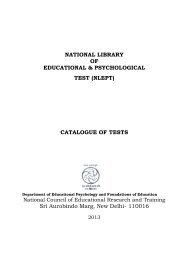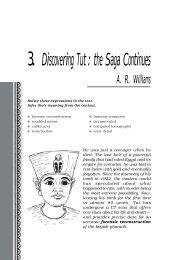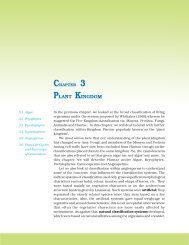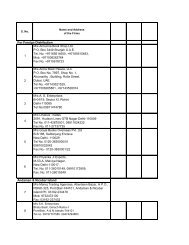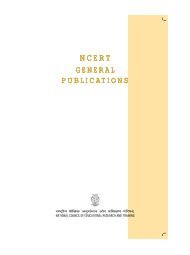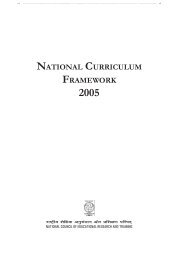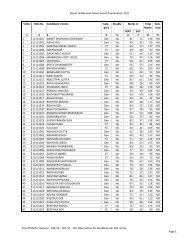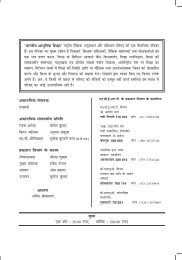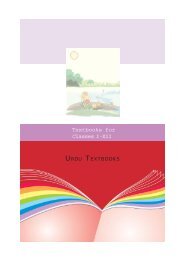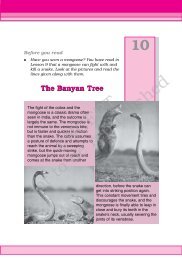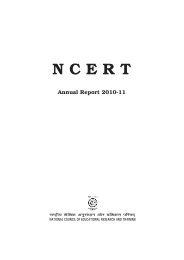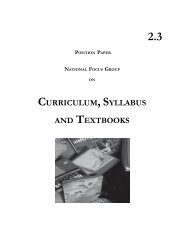indian education - National Council Of Educational Research And ...
indian education - National Council Of Educational Research And ...
indian education - National Council Of Educational Research And ...
Create successful ePaper yourself
Turn your PDF publications into a flip-book with our unique Google optimized e-Paper software.
Religion, Education and Peace 47<br />
empirical data was one of<br />
interdependence; ideology did not take<br />
precedence over evidence; history he said<br />
‘is there for those who have the eyes to<br />
see it.’<br />
Going on to illustrate with multiple<br />
examples which need not concern us<br />
here, Kosambi ended the first chapter of<br />
his An Introduction to the Study of Indian<br />
History with a quotation from Marx<br />
wherein he congratulated the<br />
philosopher’s foresight into the<br />
consequences of British colonial rule for<br />
the future of India. The colonial legacy<br />
‘of railways, and machine production, a<br />
new Indian bureaucracy, bourgeoisie,<br />
proletariat, and army’, would certainly<br />
remake the subcontinent, but would not<br />
bring any change the material condition<br />
of the people.<br />
India’s cultural pluralism, which<br />
began in the ancient world, was achieved<br />
at the cost of hidden violence that<br />
positioned caste groups into hierarchies,<br />
assigning strictly defined ecological<br />
niches to each group. Jati, like species,<br />
in this pre-Darwinian enterprise,<br />
imitated nature. The post-industrial era<br />
in India’s history has led the country into<br />
what Gadgil and Guha describe as ‘a<br />
cauldron of conflicts’. Economic and<br />
<strong>education</strong>al policies of the state have<br />
neither levelled the field for all individual<br />
citizens nor provided opportunities for<br />
advancements to the poor. The cauldron<br />
of conflicts is the result of competition<br />
and conflict over limited resources. The<br />
Indian reality only reflects the larger<br />
picture in the world where nations<br />
compete over resources and spend their<br />
wealth of weapons of power rather than<br />
on servicing the Earth.<br />
The statement is prescient despite<br />
the hopes of Indian statesmen who<br />
dreamed of erasing the hierarchical<br />
structures and hidden violence in India’s<br />
ancient societal structure when the new<br />
constitution adopted after independence<br />
enshrined the concepts of liberty,<br />
equality and fraternity.<br />
Education based on a spiritual nondivisive<br />
philosophy of J. Krishnamurti<br />
can play a positive role that<br />
D. D. Kosambi recorded in his historical<br />
reconstruction of India’s past. J.<br />
Krishnamurti, as the following quotation<br />
illustrates, defined the problems of<br />
<strong>education</strong> in a holistic framework.<br />
The world of nature and the world of<br />
man … are inter-related. Man cannot escape<br />
from that. When he destroys nature he is<br />
destroying himself. When he kills another<br />
he is killing himself. The enemy is not the<br />
other but you. To live in such harmony with<br />
nature, with the world, naturally brings<br />
about a different world. This is one of the<br />
responsibilities of the educator, not merely<br />
to teach mathematics or how to run a<br />
computer. Far more important is to have<br />
communion with the world. The world may<br />
be too large but the world is where he is;<br />
that is his world. <strong>And</strong> this brings about a<br />
natural consideration, affection for others,<br />
courtesy and behaviour that is not rough,<br />
cruel, vulgar.<br />
The world of nature and the world of<br />
man are inter-related. Man cannot<br />
escape from that. When he destroys<br />
nature he is destroying himself. When<br />
he kills another he is killing himself. The<br />
enemy is not the other but you. To live in<br />
such harmony with nature, with the<br />
world, naturally brings about a different<br />
world (Krishnamurti, 1985).



